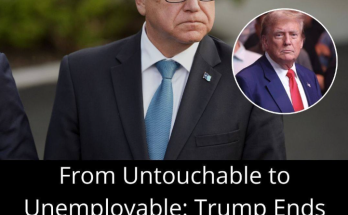
This article may contain commentary
which reflects the author’s opinion.
A federal judge on Monday temporarily halted a magistrate’s explosive order that had directed the Justice Department to hand over grand jury materials to former FBI Director James Comey, marking a brief reprieve for U.S. Attorney Lindsey Halligan as questions swirl over the government’s handling of the case.
The pause came just hours after Magistrate Judge William Fitzpatrick ruled that Halligan — a Trump-appointed prosecutor with little prior criminal experience — may have tainted the case through “profound investigative missteps” that undermined the integrity of the grand jury proceedings.
In his ruling from Alexandria, Virginia, Fitzpatrick said the record “points to a disturbing pattern of profound investigative missteps” that included errors by both prosecutors and an FBI agent.
“These missteps led an FBI agent and a prosecutor to potentially undermine the integrity of the grand jury proceeding,” the judge wrote.
Fitzpatrick ordered the government to turn over the full set of grand jury transcripts, as well as related recordings, to Comey’s defense attorneys — calling it an “extraordinary remedy” but necessary under “unique circumstances.” He also scolded prosecutors for pursuing what he called a “slapdash indictment,” accusing the DOJ of choosing to “indict first, investigate second.”
The ruling revealed internal concerns that Halligan, who was appointed in September, may have given misleading instructions to grand jurors and failed to secure proper warrants before reviewing evidence seized years earlier. Fitzpatrick found that she made “two misstatements to the grand jury that may put the case in jeopardy.”
The Justice Department immediately appealed, asking a higher court to stay the order. Later Monday evening, U.S. District Judge Michael Nachmanoff — who was appointed by former President Biden — agreed to temporarily pause Fitzpatrick’s ruling while the DOJ files formal objections. He ordered the government to submit its objections by Wednesday at 5 p.m., with Comey’s defense response due Friday.
Comey, who served as FBI director from 2013 to 2017, was indicted in September on two counts: false statements and obstruction of a congressional proceeding. The charges stem from his 2020 Senate testimony regarding whether he had authorized leaks to the press about the FBI’s handling of investigations into then-President Donald Trump and former Secretary of State Hillary Clinton.
The magistrate judge’s order also revealed that an earlier grand jury rejected a three-count indictment against Comey before the DOJ refiled with a narrower two-count case. Reuters reported that Fitzpatrick’s opinion detailed specific legal errors in Halligan’s conduct, noting that one FBI agent who testified before the grand jury may have been “exposed to material shielded by attorney-client privilege.”
“The Court finds the record in this case requires the full disclosure of grand jury materials,” Fitzpatrick wrote. “Given the factually based challenges the defense has raised to the government’s conduct and the prospect that misconduct may have tainted the grand jury proceedings, disclosure under these unique circumstances is necessary to fully protect the rights of the accused.”
Comey has pleaded not guilty and accused the Trump administration of prosecuting him out of “personal spite,” citing his role in leading the FBI’s investigation into alleged Russian influence on Trump’s 2016 campaign. His lawyers argue the indictment represents a politically motivated vendetta rather than a legitimate criminal case.
Comey is one of three prominent Trump critics charged in recent months by the Justice Department, alongside former National Security Adviser John Bolton and New York Attorney General Letitia James — both of whom have also alleged political retaliation.
A DOJ spokesperson declined to comment on the ruling but said prosecutors intend to “vigorously defend the integrity of the proceedings.”
Meanwhile, Fitzpatrick’s order has fueled debate over the department’s independence and the perception of political interference in prosecutions. Legal experts said the ruling marks one of the rare instances in which a judge has authorized disclosure of grand jury materials to a defendant, citing misconduct concerns.
“This is highly unusual,” said one former federal prosecutor. “Grand jury secrecy is sacrosanct — when a court orders disclosure, it means the judge believes the government crossed a serious line.”


